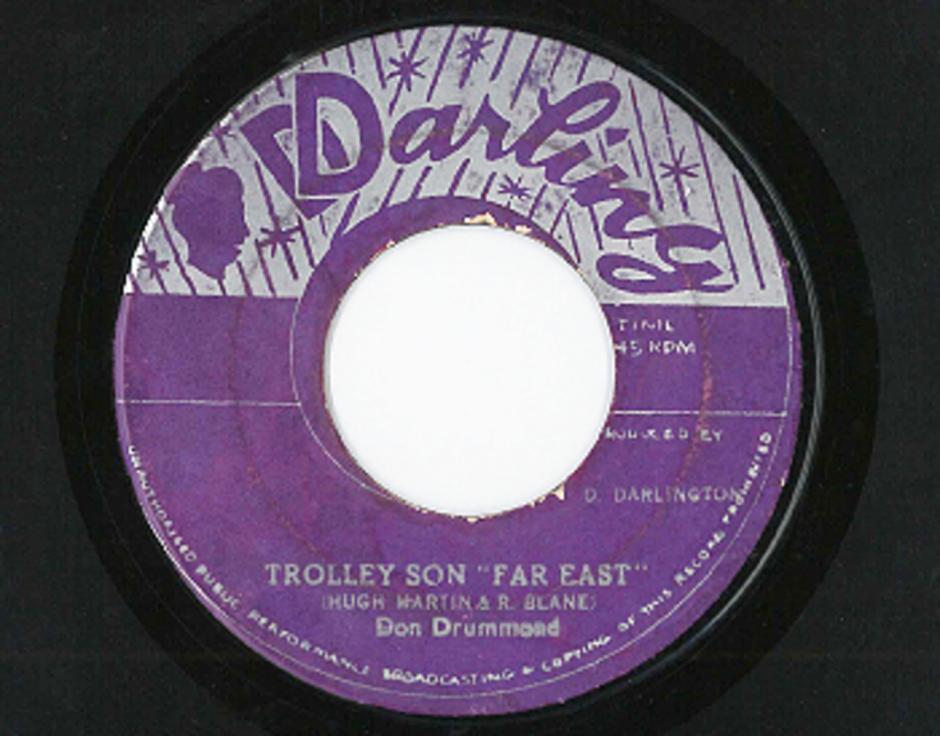Version to version: Don Drummond “Far East”
March 2022

7" label of Don Drummond's “Trolley Song” aka “Far East”. Photograph: Mark Harris
In the second of his journeys through reggae’s extraordinary versions, Chris Lane goes to the Far East with Don Drummond and Judy Garland
Don Drummond’s “Far East” (aka “Further East”) is a tune that’s been the subject of more than a few discussions since its release in 1963. At first listen, it’s a typical Don D ska tune, exactly the sort of moody, minor key instrumental that he became famous for with The Skatalites and has made his music endure so well for the best part of 60 years.
But this one’s different. Don spices up the main melody with some interesting variations, and it becomes clear that he’s put a lot of thought into this. It’s far from one of those end of session, one chord ska jams that we all know and love.
After a minute and a half of “Far East”, the band launches into a swinging bridge which sounds very much like it’s been borrowed from a showtune or a jazz standard … or has it? By the time you’ve realised there’s something vaguely familiar about it, they’re back into the head, which quickly turns into another bridge, this time with an ascending melody which again sounds a little bit like something else… and then it’s finished.
There are no solos, and there’s no showing off, from anyone. “Far East” has been meticulously orchestrated and all of the musicians are following Drummond’s arrangement with as much precision as they can, presumably reading the parts he’s written out for the horns players, and charts for the bass, guitar and piano.
I have to admit I’d never have guessed its origin until I saw a copy of the original D Darling release (see photo), which clearly states “Trolley Son ‘Far East’” (sic). The label also credits Hugh Martin and Ralph Blane as the writers, which is highly unusual in an industry were producers would either leave the composers’ credits as a blank space or put their own names in and claim to have written themselves. And the original is best known through Judy Garland’s 1944 film Meet Me In St Louis.
You may well think that it’s an odd tune to cover, and perhaps it is. Carlos Malcolm, the renowned Jamaican bandleader and trombonist, recalled that Drummond had told him that producer Clement ‘Coxsone’ Dodd had asked him to record a ska version of “Trolley Song” but that he hadn’t yet thought of how to do it. Apparently, Malcolm said that he didn’t think it would work as a ska instrumental, but then he heard the tune playing on the radio a few weeks later, only recognising the song when he heard the bridge.
Although it’s entirely possible that Drummond may have played the song when he was at the legendary Alpha School or working with hotel bands, and that he may also have heard jazz recordings by Dave Brubeck, Melba Liston, Tubby Hayes, etc. it’s still unclear as to how he came up with this unique arrangement. Was he influenced by the 1959 cut by MJT+3 (Walter Perkins’s band with Frank Strozier, Willie Thomas, Harold Mabern and Bob Cranshaw), even though they use a different approach and stick a lot closer to the original melody?
So what has Don Drummond done to make “The Trolley Song” sound almost absolutely nothing like one of Judy Garland’s most famous songs? To put it as simply as possible, he’s reimagined the tune and ‘minorised’ it, that is he’s turned a happy sounding major key melody into a gloomy minor melody by changing the harmony (and starting the melody on a different note of the respective chord). If he did it as an experiment, it worked brilliantly, and we can only wonder why he didn't do this more often.
Although it was something of a hit, and has remained popular with ska fans and collectors ever since, the complicated arrangement – and the plethora of other more accessible ska instrumentals – seems to have discouraged other musicians and producers from recording their own versions, so Don Drummond’s innovative masterpiece stands alone in the pantheon of ska classics as a unique example of his genius.
Chris Lane is a label boss, writer, producer and selector based in London. Subscribers can read more about his Fashion Records label in Neil Kulkarni’s feature in The Wire 421 via Exact Editions
Leave a comment